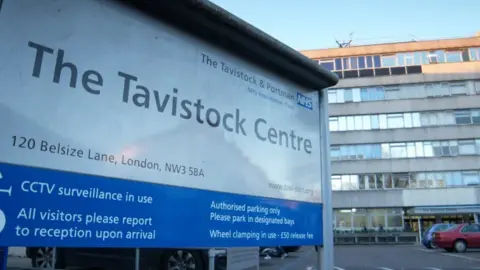NHS launches ‘safer’ child gender service model
 Getty Images
Getty ImagesNHS England has confirmed that six new regional centres designed to support young people under the age of 18 struggling with their gender identity will open over the next two years.
They will join two existing clinics to improve gender-related services for children and young people.
It will focus on providing a more holistic approach, with a particular focus on supporting people with conditions such as mental health and autism.
This comes after a ban imposed earlier this year on the routine prescription of puberty blockers for children with gender dysphoria. The change comes in response to a landmark review published in April, which criticised the way support was offered to young people.
Puberty blockers
The Cass review, led by paediatrician Dr Hilary Cass, called for better psychological support, saying young people struggling with their gender also have higher rates of mental health problems and neurological differences – such as autism and ADHD – or have suffered childhood trauma.
Previously, the only NHS clinic to provide gender-related services for children was the Tavistock and Portman NHS Trust in London.
It was criticised for relying too heavily on medical intervention, and used puberty blockers to delay the onset of puberty even though there was no evidence that the drugs had any positive effect.
In January 2021 its services were judged inadequate by inspectors.
 PA Media
PA MediaThe Tavistock Clinic was closed in March,
In April two new services were launched in London and the north-west of England, which will be run in collaboration with leading children’s hospitals Great Ormond Street and Alder Hey in Liverpool.
The planned opening of six new regional centres will begin in Bristol this autumn, with another centre in eastern England opening in March 2025.
These clinics will also provide services to children and young people in Wales. Scottish ministers are also considering a similar approach.
NHS England has also announced how the clinics will work.
GPs will no longer be able to refer patients directly. Instead, referrals will have to come through children and young people’s mental health services and hospital child health specialists.
The move has been taken to enable the wider needs of these children to be assessed before they are referred to a specialist centre, and follows a sharp increase in referrals in recent years.
However, the proposal to allow referrals only after the age of seven was dropped.
‘Fundamentally different’
Additionally, care at specialist centres will be overseen by a paediatrician or psychiatrist, with advice from other specialists.
As well as mental health support and help for conditions such as autism, the emphasis will be on supporting the whole family, including some social care provision in cases where family relationships have broken down.
Advice and guidance about social transitioning – when a young person presents as the gender opposite their biological sex – will also be available.
The regional centres will also provide support for young people turning 18 who want to access adult gender care services, where hormone treatment and surgery are available – although these services will also be reviewed, NHS England has said.
Professor Stephen Powis, medical director for NHS England, said the new system aimed to establish “a fundamentally different and safer model of care for children and young people”.
 Getty Images
Getty ImagesNHS England hopes these changes will also help reduce waiting times.
A freedom of information request released by PA Media this week revealed the average waiting time for the 5,700 people under the age of 18 on the waiting list for specialist gender care was 100 weeks. The youngest person on the waiting list was under five.
Dr Cass said she was “delighted” that NHS England was moving towards implementing her recommendations.
But he added: “The next step will be the most challenging — turning it into reality.”
Last week, the British Medical Association (BMA) called for the Cass review’s recommendations to be put on hold so it could carry out its own assessment. It said the ban on puberty blockers should be lifted.
The BMA’s statement is at odds with most of the medical establishment, which has been supporting these changes.



